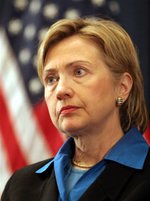Anxious to find some sort of phony story to tide them over until the speechifying, MSNBC and other cable networks are pushing this "Democratic split" nonsense.
What makes me angry is not that it’s a lie. What makes me angry is they know it.
Fueling the lie are surveys showing upwards of 30% of "Hillary supporters" insist they won’t vote for Obama. Fact is most of these people were never Hillary supporters to begin with.
As the press reported at the time, Republicans made a concerted effort to keep the Democratic race going by supporting Clinton. In states like Mississippi the bulk of her vote came from committed Republicans just trying to muddy the waters.
So of course if you poll these people a lot of them will say they support the Republicans. They’re Republicans. Duh!
Any Clinton supporter who goes to McCain at this point never really supported Clinton in the first place. They have no clue where she stands, no clue what she believes in, they’re trolls or drama queens. I’m sure she will make this clear when she speaks tonight, and the press will have to find something else to obsess over tomorrow.
This is just the way the "old media" works. You have to have a story, you have to have a conflict, or else you think you’re wasting your time.
No, you don’t.
Conventions have not been about conflict for a generation. They are
about party-building, they are about networking among party regulars.
One of the biggest stories coming out of this convention is how so many
liberal bloggers are being welcomed to the confines of Democratic power
as players this time, not some fringe element, as was the case in 2004.
That’s a big story. No one is covering it. In fact, even the bloggers
aren’t covering it. They’re just taking the attention as their due,
usually without thought.
A political convention is also, as Chuck Todd recently said on MSNBC, a
bubble as much a bubble as Washington DC itself is. Information from
the real world has no way to get in, and nothing exists outside the
bubble, for all those inside.
This is, in fact, a business convention, much like a CES or a HIMSS
show. It’s a show about the business of politics. The only difference
is that the keynotes are at night rather than in the morning.
The press covers both convention and compares them using polls. That’s the external value of conventions. That’s the only value.
The people within each
show are there to meet-and-greet, to exchange business cards, to place
faces to names, to plan strategy for their big sales push which begins
as soon as they leave. For many of these people, on both sides, the
conventions represents the start of a two-month push during which they
will be totally absorbed in the coming drama of November, and totally
divorced from their real lives of home and office.
That’s what political conventions really are. They’re not dramas,
they’re not mini-series, they’re business meetings. It would be nice
if, just once, someone covered them for what they are, and didn’t feel
the need to create lies in order to have something to talk about.













I would have loved to have seen Hillary in the White House. Oh well, beter luck next time.
RD
http://www.useurl.us/12m
I would have loved to have seen Hillary in the White House. Oh well, beter luck next time.
RD
http://www.useurl.us/12m